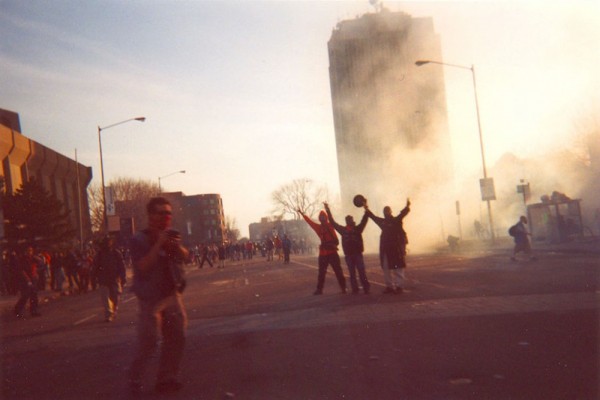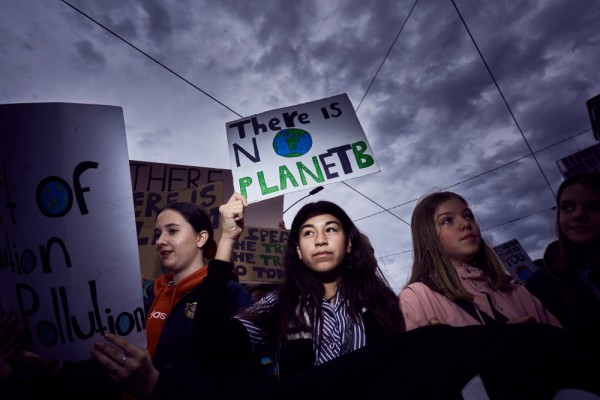Remembering Seattle: Class, globalization, and the state

Protester Douglas Mackar, right, with a copy of the U.S. Constitution in his hand, and Seattle Police Lt. Daniel Whelan deliver conflicting messages on their bullhorns during the WTO protest on Nov. 29, 1999. Photo by the Seattle Post-Intelligencer.
Very early in the morning on 30 November 1999, I climbed onto a bus in Vancouver, BC to travel to Seattle, Washington, to confront global capital. Not by myself of course, I was going to join the trade union contingent protesting against the World Trade Organization and its millennial round of talks – what would become known as the “Battle in Seattle.” I was working for the Teaching Support Staff Union (TSSU) a small independent union at SFU and we hitched a ride with the BC Teachers Federation (BCTF) bus that was going to the labour march and protest. I was not an organizer so this is a participant observer account of what transpired on a day in the Battle of Seattle.
We crossed the border into the US with a minimum of hassle. It was pre-9/11 and borders were easier to cross. When we arrived the scene in Seattle was chaos, but a glorious, magical, anything can happen, kind of chaos. Intersections were blocked by people locked together at the arms, environmentalists dressed as sea turtles, dancing, drumming, giant puppets; the streets were teeming with protesters. All entry to the WTO meetings had been blocked. The ILWU had shut down the ports up and down the West Coast. The meetings were cancelled by noon that day.
The union rally was in the old outdoor area at the Seattle Center. The working-class had mobilized in force and we were going to reinforce the protest. However, unbeknownst to most, the route had been changed. Marshals were trying to turn us away from the protest. About a dozen marchers, one with a megaphone, started shouting, “This way! This way!” They broke through the marshals and thousands of us streamed into the streets of protest. The majority of the labour march did not converge directly on the WTO site but thousands of workers did.
I didn’t know it at the time but a state of emergency had been declared at 3:30 pm. What had been blockades and celebrations had become running battles with the police. There were clouds of teargas on the street, phalanxes of cops moving in with billy clubs. Screaming, fighting, and chanting. Thousands of people held the line. I joined in. Those fleeing were simply being chased down, beaten, and arrested. It had gotten dark. I seem to remember a bonfire burning at one of the intersections but that may be a ghost memory, something I saw on TV the next day.
At the end of the day, both literal and metaphorical, we were confronted with the state. I teach labour studies and history and many of my lessons revolve around hegemony, how the ruling class manages to frame their interests as general interests. How they win our consent to be governed. However, the State always reserves the inherent right to use force. That was what happened that afternoon and throughout the night of November 30 1999 – the violent part of the state apparatus.
The protest in Seattle demonstrated the power of a convergence of class and new social movement politics but without a plan to seize state power the left will always be reactive. The lessons of Seattle are the power of solidarity but also the power of the state. Protests are empowering, they generate solidarity, but they can only slow down capital momentarily. A truly independent socialist alternative needs to be built. Perhaps this lies with Bernie and AOC in the US and Corbyn in the UK, but Canada sorely lacks any real socialist party or leader. We need to build one based on socialist principles. Anything less and we set ourselves up for failure. Glorious, anything can happen, kind of failure but failure none the less.
John-Henry Harter is a lecturer in Labour Studies at Simon Fraser University. He has published in the journals Labour/Le Travail, Popular Culture Review, The Otter, and Active History. He writes on Class, the Environment, and Popular Culture, when not consuming too much coffee and TV. Follow him on Twitter @JohnHenryHarter.










